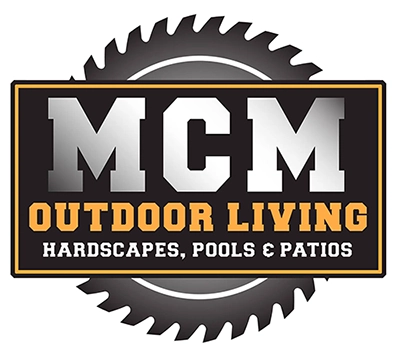Cooking outside brings a certain kind of freedom. The smell of food in fresh air, the open sky above you, and no one squeezing past you in a crowded kitchen. But beyond the charm, many homeowners are asking a more practical question: does an outdoor kitchen add value to a home?
With the growing popularity of outdoor living spaces, especially in regions with warmer weather, it’s no surprise that outdoor kitchens are showing up more in listings, and more often in buyers’ wish lists. But how much value do they really bring? And is the investment worth it?
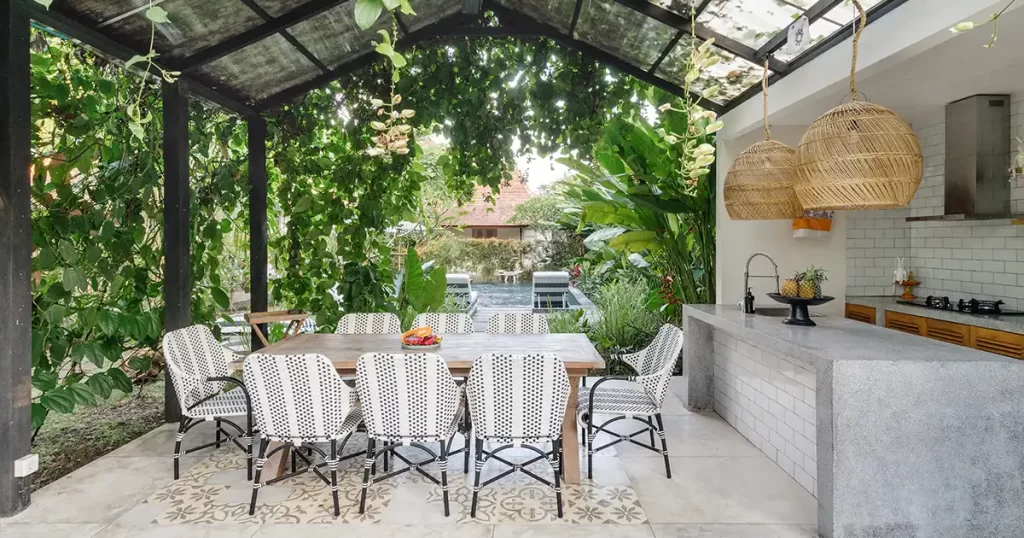
Let’s look at the factors that influence how an outdoor kitchen affects your home’s worth, what to include, and when it makes the most sense.
A Shift in What “Living Space” Means
Years ago, buyers primarily judged a home by its interior. Today, expectations have shifted. Outdoor areas are viewed as an extension of the home. Somewhere to relax, cook, celebrate, or unwind after a long day.
This is especially true when the outdoor space is usable year-round. With the right layout, lighting, and appliances, the backyard can become a true living area and not just a place for weekend barbecues.
In many markets, especially those with mild climates, that shift in thinking has made outdoor kitchens a feature with real weight in both appraisals and buyer perception.
Value in Numbers: What Do the Experts Say?
Quantifying the exact return on investment for an outdoor kitchen isn’t easy. There’s no one-size-fits-all number. However, most real estate professionals agree that it can boost a home’s value when done correctly.
The National Association of Realtors’ 2023 Remodeling Impact Report found outdoor kitchens delivered an average 100% cost recovery at resale.
The same report showed that 99% of homeowners felt a stronger desire to be at home after adding one, and 71% reported greater enjoyment of their property.
That combination is what makes outdoor kitchens unique: they can improve resale value while also delivering lifestyle upgrades that make the space more livable and enjoyable every day.
Value isn’t just about money. A well-planned outdoor space also adds to your daily life, your family’s enjoyment, and your home’s overall feel.
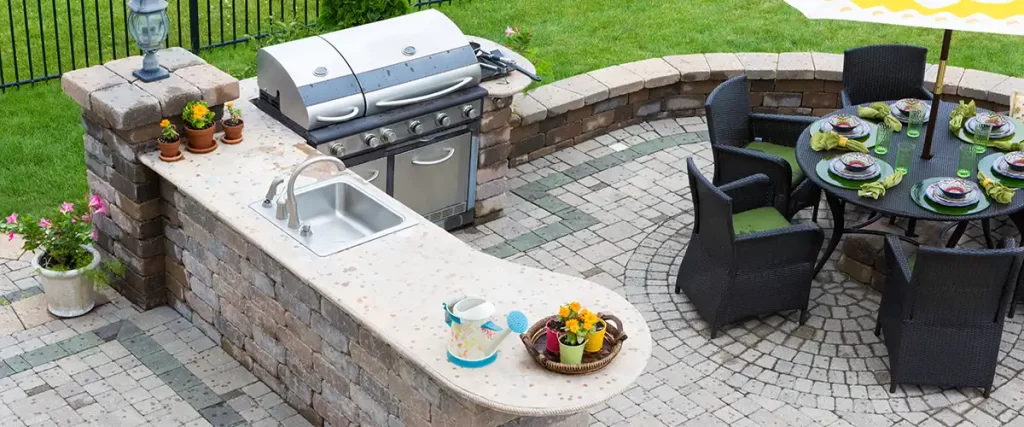
How Appraisers Evaluate Outdoor Kitchens
When it comes to formal valuation, professionals typically use three methods to assess how much a project like this contributes to your home’s value:
- Sales Comparison Approach: Compares your home to others that have recently sold. If nearby homes have outdoor kitchens and yours doesn’t, it may be seen as lacking. If yours has a better setup than others, it might justify a higher price.
- Cost Approach: Looks at how much it would cost to replace or build the kitchen today, minus depreciation. This is useful when outdoor kitchens aren’t common in the area.
- Income Capitalization Approach: Used more for investment properties, such as vacation rentals. In these cases, a well-equipped outdoor kitchen can allow owners to charge higher rates or reduce vacancy.
Each method has its purpose, but all depend on quality, maintenance, and market trends.
Not All Outdoor Kitchens Are Equal
Installing a few pavers and rolling out a grill might make the backyard more enjoyable, but it won’t add real financial value. Buyers and appraisers notice whether something was custom-built or pieced together.
To truly influence property value, an outdoor kitchen should:
- Be built with weather-resistant materials
- Include permanent fixtures, like a built-in grill or plumbed sink
- Feel like a natural extension of the home, not an afterthought
- Offer features that are easy to maintain
Durable materials such as stone, stainless steel, and sealed concrete fare much better than wood or other soft finishes. Using high-end touches like granite countertops, outdoor-rated appliances, or infrared burners can make a big difference.
Also, matching the kitchen’s style with the house can elevate its overall appearance and create visual harmony.
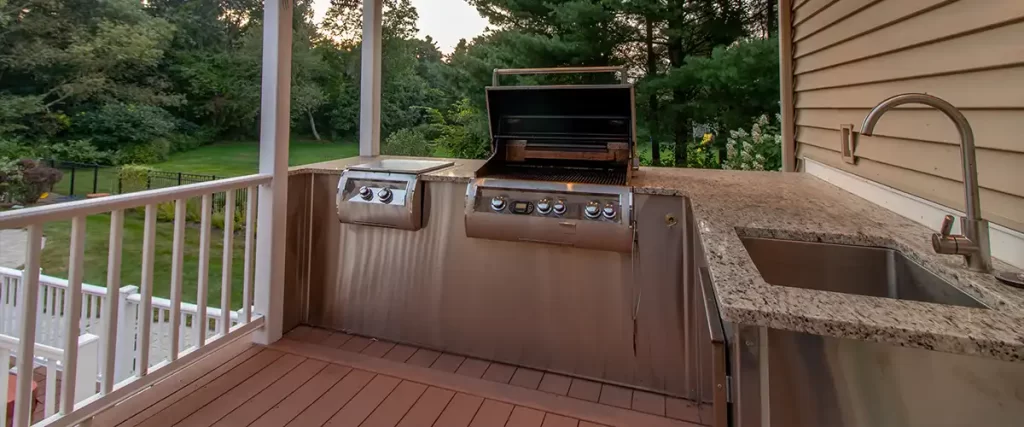
What Features Catch the Most Attention?
Certain elements carry more weight when buyers are comparing homes. A few high-impact features include:
- Built-in grill, preferably fueled by natural gas or a direct propane connection
- Sink with faucet for prep and cleanup
- Outdoor refrigerators to store drinks, produce, and cold dishes
- Pizza ovens for added flair and function
- Storage drawers and cabinetry, especially for utensils and spices
- Ample counter space for prep and serving
- Comfortable seating areas for guests or family meals
- Good lighting, both functional and ambient
- Overhead shade structures or a roof extension
- Fire pits or heating elements to extend seasonal use
You don’t need to install every appliance available. What matters is creating a space that’s inviting, practical, and built to last. A basic outdoor kitchen, if done well, often brings more value than a larger, overcomplicated setup with weak materials.
When Outdoor Kitchens Might Not Add Value
It’s possible to overdo it. Spending tens of thousands on luxury outdoor appliances and finishes that far exceed the rest of the home’s quality might not be money well spent, at least not from a resale standpoint.
Here are a few common pitfalls:
- Overspending for the neighborhood
- Poor layout or lack of accessibility to the main home
- Weak drainage or lack of weather protection
- Choosing appliances that aren’t rated for outdoor use
- Forgetting to add shade, storage, or functional lighting
In some cases, a smaller, more focused project, using quality materials and a practical layout, delivers better long-term value than a sprawling, expensive build.
Financial Return vs. Personal Return
The financial upside is real, but for many families, the most rewarding part of building an outdoor kitchen is how often it gets used. Morning coffee outside. Cooking while your kids play in the yard. Friends gathered around a fire pit while the pizza oven heats up.
There’s something special about a space that naturally brings people together. You may end up using it more than your indoor kitchen. And that kind of return matters, too.
Still, if resale is on your mind, having something buyers view as an upgrade instead of a maintenance task can absolutely improve your position in the market.
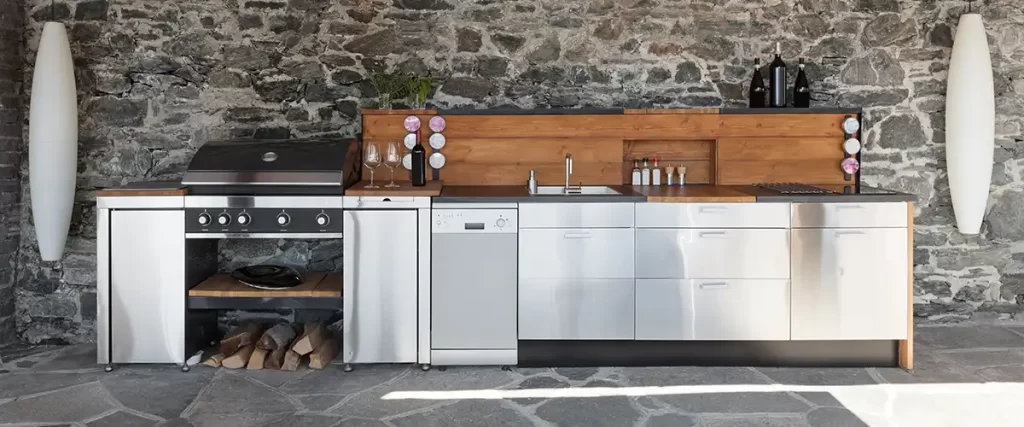
Not Sure Where to Start?
Trying to figure out what to include, how much to spend, or what your yard can support can be overwhelming. Add in decisions about utilities, material compatibility, and future resale. And it’s easy to get stuck.
If you’d rather focus on the fun parts, like how you want the outdoor kitchen to feel, we can take care of the rest.
Call us at (469) 583-6213 or message us here. We’ll help you create something that feels right for your home, your family, and your future. And if it also increases the value of your home? That’s just a bonus worth celebrating.
FAQ
Does an outdoor kitchen add value to a home?
Yes. When designed with durable materials and permanent fixtures, an outdoor kitchen can improve buyer appeal and support a higher sale price in many markets.
What features matter most to buyers and appraisers?
Key features include a built-in grill, plumbed sink, outdoor-rated appliances, ample counter space, storage, proper lighting, shade, and a layout that blends with the home.
What factors influence the return on an outdoor kitchen?
Return depends on local demand, climate, build quality, material durability, and how well the kitchen fits the home. Overbuilding for the neighborhood can limit ROI.
Do portable grills or temporary setups add value?
Temporary setups improve enjoyment but rarely affect appraised value. Permanent, weather-resistant builds carry more weight.
How do appraisers evaluate an outdoor kitchen?
They may compare similar homes, calculate replacement costs, or look at income potential for rentals. Materials, condition, and market norms all play a role.
When might an outdoor kitchen not add value?
If the project exceeds neighborhood standards, uses weak materials, lacks drainage or accessibility, or feels like an afterthought, it may not boost resale.
What materials hold up best outdoors?
Stone, stainless steel, sealed concrete, and other outdoor-rated finishes outperform wood and softer materials in long-term durability.
Is a basic outdoor kitchen still worth it?
Yes. A smaller, well-built kitchen with core utilities and durable finishes often delivers more value than a sprawling setup built with weaker materials.
